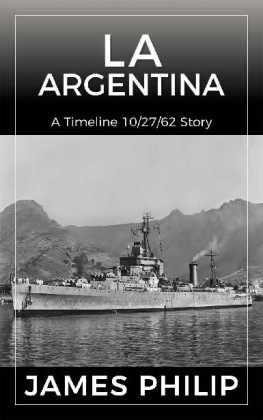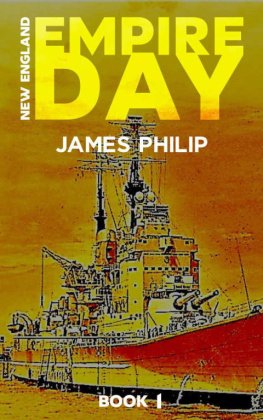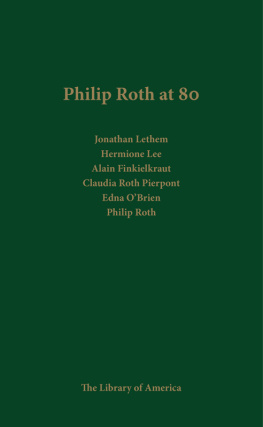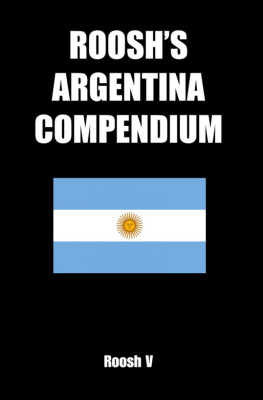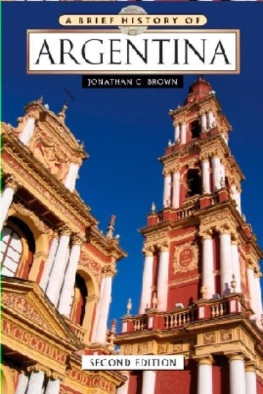James Philip - La Argentina: A Timeline 10/27/62 Story
Here you can read online James Philip - La Argentina: A Timeline 10/27/62 Story full text of the book (entire story) in english for free. Download pdf and epub, get meaning, cover and reviews about this ebook. year: 2020, genre: History. Description of the work, (preface) as well as reviews are available. Best literature library LitArk.com created for fans of good reading and offers a wide selection of genres:
Romance novel
Science fiction
Adventure
Detective
Science
History
Home and family
Prose
Art
Politics
Computer
Non-fiction
Religion
Business
Children
Humor
Choose a favorite category and find really read worthwhile books. Enjoy immersion in the world of imagination, feel the emotions of the characters or learn something new for yourself, make an fascinating discovery.
- Book:La Argentina: A Timeline 10/27/62 Story
- Author:
- Genre:
- Year:2020
- Rating:3 / 5
- Favourites:Add to favourites
- Your mark:
- 60
- 1
- 2
- 3
- 4
- 5
La Argentina: A Timeline 10/27/62 Story: summary, description and annotation
We offer to read an annotation, description, summary or preface (depends on what the author of the book "La Argentina: A Timeline 10/27/62 Story" wrote himself). If you haven't found the necessary information about the book — write in the comments, we will try to find it.
La Argentina: A Timeline 10/27/62 Story — read online for free the complete book (whole text) full work
Below is the text of the book, divided by pages. System saving the place of the last page read, allows you to conveniently read the book "La Argentina: A Timeline 10/27/62 Story" online for free, without having to search again every time where you left off. Put a bookmark, and you can go to the page where you finished reading at any time.
Font size:
Interval:
Bookmark:
James Philip
________
LA ARGENTINA
____
A Timeline 10/27/62 Story
Copyright James P. Coldham writing as James Philip 2020. All rights reserved.
Cover concept by James Philip
Graphic Design by Beastleigh Web Design
The Timeline 10/27/62 Series
________
Main Series
Book 1: Operation Anadyr
Book 2: Love is Strange
Book 3: The Pillars of Hercules
Book 4: Red Dawn
Book 5: The Burning Time
Book 6: Tales of Brave Ulysses
Book 7: A Line in the Sand
Book 8: The Mountains of the Moon
Book 9: All Along the Watchtower
Book 10: Crow on the Cradle
Book 11: 1966 & All That
Book 12: Only in America
Book 13: Warsaw Concerto
Book 14: Eight Miles High
Book 15: Wont Get Fooled Again
A Standalone Timeline 10/27/62 Novel
Football in the Ruins The World Cup of 1966
A Standalone Timeline 10/27/62 Novella
The House on Haight Street
La Argentina
Puerto Argentina
A Kelpers Tale
Coming in 2020-21
Book 16: Armadas (2020)
Book 17: Smoke on the Water (2021)
USA Series
Book 1: Aftermath
Book 2: California Dreaming
Book 3: The Great Society
Book 4: Ask Not of Your Country
Book 5: The American Dream
Australia Series
Book 1: Cricket on the Beach
Book 2: Operation Manna
For the latest news and author blogs about the
Timeline 10/27/62 Series check out
www.thetimelinesaga.com
Contents
LA ARGENTINA
[Timeline 10/27/62 Series A STANDALONE STORY]
The gang of three-and-a-half
There were three of them: the physician doctor who may have genuinely hoped he might heal his divided nation, and the two generals, one the great puppeteer of his generation of Argentine Army officers, the other a would-be technocrat who almost but not quite knew what he was doing. And, forgotten nowadays, there was the admiral who went along with the greatest gamble in his fragile countrys history and privately, bitterly regretted it.
But the interplay of the personalities of the plotters in Buenos Aires is just one aspect of Operacin Justicia del Sur that has teased and frustrated historians ever since. One that I will return to later.
First, if one is to discuss the events of those years sensibly, one must dispel the most common, and in many ways, seductive myths about the Argentine seizure of the Malvinas and the other remote territories in the South Atlantic and Antarctica which it rightly or wrongly felt to be its sovereign soil.
Conspiracy theorists have always claimed that the Argentine regime deliberately mounted Operacin Justicia del Sur to coincide with the incursion by two Soviet tank armies into Persia, and the Red Navys audacious and ultimately doomed, attempt to invade the Maltese Archipelago.
To be clear: there was no contact between the Soviet leadership and the proto-Junta in Buenos Aires. Moreover, there was no Soviet legation, or third-party, or proxy representation of what we now know to be the Sverdlovsk Kremlin in Argentina. In this context it is as well to remember that at that time there was no more fervently, virulently anti-communist regime in Latin America than that based in the popularly named Casa Rosada the Pink Palace, officially, the Casa de Gobierno , or House of the Government, in the mid-1960s the residence and office of the President of Argentina - situated at the eastern end of the Plaza de Mayo.
In fact, there is a great deal of evidence, including primary sources such as personal diaries and the minutes, contemporaneously written, of military and political meetings within the government in the first week of April 1964, that indicates not satisfaction but disquiet, that the Republic should have struck what both the officer class and the political elites instinctively regarded in hindsight - as a dishonourable blow against one of the last remaining bastions against the wounded Soviet beast, at the worst possible time in the ongoing campaign to hold back the threat of International Marxist-Leninism.
Another misconception is that the Kennedy Administration gave the Argentine, in effect, a guarantee that it would turn a surreptitious blind eye if it acted militarily against the Malvinas.
All that came at us out of a clear blue sky! President Kennedy told this author many years later. Secretary of State Fulbright, that was, J. William Fulbright, the man who had stepped into the late Dean Rusks shoes after the Battle of Washington in December 1963, thought those idiots in Buenos Aires had gone mad!
However, that is not to say that mid- to lower-level operatives within the CIA or the South American Section of the State Department might have green-lighted some non-specific, new non-violent initiative of some kind, presumably to curry favour with the regime in Buenos Aires, which most White House insiders recollect had gone rogue at that time. In all dealings with Latin America in that period there was always a great deal of scope for meanings to get lost in translation.
Further to this, conspiracy theorists have become attached to the notion that the mysterious figure of James Jesus Angleton, the long-standing Associate Deputy Director of Operations for Counterintelligence (ADDOCI), and therefore the Chief of CIA Counterintelligence, who was assassinated as the scandal over Operation Chaos the unconstitutional mass surveillance of American citizens broke in 1967, might have been running some kind of spoiling operation against the British, or simply manipulating the men in the Casa Rosada just for fun.
The problem with that, is none of it rings true and no documentation supports it, other than papers cataloguing hearsay speculation repeating earlier gossip, in some of the more bizarre recent-day CIA document releases. Notwithstanding, that the myths and legends surrounding Angleton continue to fascinate the unwary and the gullible, the rational mantra must be with all these fairy stories: beware old Langley hands bearing gifts!
The other, to our contemporary ears, unlikely myth which circulated a decade or so after the event, was that the Thatcher Government, beset with so many other more pressing crises like the struggle to feed its own people and with the seemingly deepening crisis in the Mediterranean and the Middle East, in some way communicated to the Argentines that Her Majestys Government would at some point in the future, meekly accept the fait accompli of the April 1964 invasion.
We now know that this also, was not true.
There is a broader question: whether a substantial number of people in the British Isles, representing every hue of political opinion were indeed, if not happy then perfectly resigned to the loss of the Falklands, South Georgia, South Thule and the innumerable other distant, wind and wave-swept uninhabited islands and islets in the wastes of the Southern Ocean comprising the Falkland Islands Dependencies? It is likely that a majority of citizens of the British Isles, if they had heard of the Falkland Archipelago at all, would have been hard-pressed to point to it on a map of the world; but that had never stopped the British getting jingoistic about a far-flung, threatened piece of the Empire before. So, the jury is out on whether the British cared, one way or the other, about those islands in the South Atlantic, given their other problems, before the night of 2nd/3rd April 1964. All the evidence is that, after that date, they did care. At least, a substantial number of them. Even now, the whole debate about the Falkland Islands still has an unrivalled capacity to raise hackles, and not surprisingly, it has been the subject of countless books, treatises and polemics.
Putting aside conspiracy theories, the Argentine blundered into the war over the Malvinas, in the main, because its leadership had embraced a particular, insular strategic tunnel-vision which took no account of the wider, global impacts or consequences of their actions. At no time, did senior members of the Kennedy Administration explicitly, or by a wink or a nod, communicate anything but unambiguous discouragement to the Casa Rosada (although one suspects that whatever JFKs advisors had said to the Argentines leaders they might still have heard whatever they wanted to hear at the time, such was the mood in the country).
Font size:
Interval:
Bookmark:
Similar books «La Argentina: A Timeline 10/27/62 Story»
Look at similar books to La Argentina: A Timeline 10/27/62 Story. We have selected literature similar in name and meaning in the hope of providing readers with more options to find new, interesting, not yet read works.
Discussion, reviews of the book La Argentina: A Timeline 10/27/62 Story and just readers' own opinions. Leave your comments, write what you think about the work, its meaning or the main characters. Specify what exactly you liked and what you didn't like, and why you think so.

